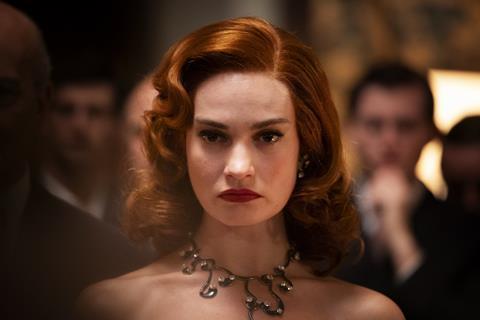Saverio Costanzo’s Cinecitta-set delight harks to the heyday of ‘Hollywood on the Tiber’ and co-stars Lily James and Willem Dafoe

Dir/scr: Saverio Costanzo. Italy. 2023. 140mins
A young working-class woman is reluctantly dragged along to an extras audition as her sister’s chaperone and somehow finds herself in costume and on set, thanks to a chance encounter with the film’s leading lady. But the first feature in nine years from eclectic Italian writer-director Saverio Costanzo, and his first entirely original script, is no retread of A Star Is Born. In fact, it seems more obviously influenced by Costanzo’s six-year long immersion in the dark female narratives of Italian writer Elena Ferrante, whose tetralogy My Brilliant Friend he adapted, directed and showran for HBO/Rai.
An Italian film that seems purpose-built to appeal to international audiences.
Set in Rome’s sprawling Cinecittà studios in their 1950s heyday, Finally Dawn is a rich, shape-shifting fairy tale, an odyssey of empowerment about a vulnerable girl navigating her way through a day and night of enchantments and dangers, using her weakness as a kind of magic shield. It also has a lot to say about acting at a time when an older generation of Hollywood stars found themselves challenged by young Method rebels, about the pressures of celebrity, about the patriarchal undertow of menace, abuse and coercion that lay behind the glittering façade of Rome’s dolce vita years.
Lily James, Joe Keery and Willem Dafoe add lustre to a breakout performance by emerging Italian actress Rebecca Antonaci, ravishing cinematography by Thai master Sayombhu Mukdeeprom and Costanzo’s confident script and direction. All this should further bolster an Italian film that seems purpose built to appeal to international audiences.
One of the film’s simplest pleasures is its evocation of the craft, business and outreach of cinema during the golden years of ‘Hollywood on the Tiber’, as Cinecittà was known. Fellini’s favourite Studio 5 soundstage and the production facility’s vast outdoor sets loom large, but so does the spillover industry outside the studio gates – a world of ‘I can make you an actress’ pick-up artists, celebrity restaurants with cheesy floorshows, and grand coastal villas owned by shady aristocrats who are not above pimping the girls they invite to their all-night parties.
The most accomplished work to date by the director of Hungry Hearts (2014), Finally Dawn orbits around the still unresolved real-life case of Wilma Montesi, a Cinecittà extra who was found dead on a beach near Rome in April 1953. Rumors of orgies and conspiratorial cover-ups by a powerful clique swirled around in the months and years that followed, fueling Fellini’s jaded take on the cult of celebrity, La dolce vita (1960). Costanzo’s script feels like some kind of a reparatory tribute to Wilma: rather than tell her story directly, the writer-director fashions an alternative, redemptive narrative for her via his wide-eyed ingenue central character, Mimosa, played by relative newcomer Antonaci. A symbolic spirit-animal finale may test the resolve of some audiences – but this is a fairy-tale, after all.
In her first film role after a series of TV appearances, Antonaci is strangely magnetic. She is the fresh new face in a film that is cast with a certain meta-cinematic knowingness. Lily James plays Josephine Esperanto, the big star of a Cinecittà-shot colossal epic about ‘Egypt’s only female pharoah’ (no, she didn’t exist), who takes a shine to Mimosa. Joe Keery is Josephine’s co-star, Sean Lockwood, an upcoming talent who can’t break off the romantic or career hold the actress has over him, much to the frustration of Nan (comedienne Rachel Sennott), the Nile caper’s third lead, who has her own thing going with Sean.
All three actors are, in different ways, racked with creative self-doubt and desperate for approval. Mimosa becomes the expressive, silent cipher they measure themselves against – a star-struck fan scooped up by the capricious Josephine, presumably because of the emotional authenticity she sees in her. James’ neurotic diva, schooled in an older, stiffer dramatic tradition, wants those things, but she also wants to crush them – an impulse that comes to the fore when, in the film’s most powerful scene, she forces the unhappy Mimosa to perform in front of a cynical audience at a decadent villa party close to the beach where Montesi’s body was found.
Mimosa speaks no English, her celebrity companions next to no Italian. At first, Willem Dafoe’s Rufus Priori, a canny but also kindly art dealer and friend of Josephine’s, translates between the two sides, but soon Mimosa – Josephine’s “plaything for the night”, as Italian actress Alida Valli (Alba Rohrwacher) accurately remarks at that villa party – is reduced to silence, or left to express herself in an Italian that is never answered. (Dubbing into a single language would do the film a great disservice).
The gap between speaking and understanding – Josephine’s surname, ‘Esperanto’, must surely be ironic – is just of the disjuncts Finally Dawn embeds in its story and its style to turn what might have been a simple ‘young girl’s dream come true’ fable into something deeper, tenser and more resonant. Another is the way it uses Massimo Martellotta’s nuanced score. The melodramatic orchestral music of the neo-realist drama Mimosa watches with her mother and sister at the beginning is revived in the film’s ‘real world’, when the trio run for a bus after the screening. But as we watch the final take of the final scene of that Egypt-set film-within-a-film, a thudding electronic beat suddenly emerges. One effect of this musical crossover is to connect then and now, suggesting that this town in which celebrity culture leeches into everyday life still exists today.
Production company: Wildside
International sales: FilmNation Entertainment, nyoffice@filmnation.com
Producers: Mario Gianani, Lorenzo Gangarossa
Production design: Laura Pozzaglio
Editing: Francesca Calvelli
Cinematography: Sayombhu Mukdeeprom
Music: Massimo Martellotta
Main cast: Rebecca Antonaci, Lily James, Joe Keery, Rachel Sennott, Alba Rohrwacher, Willem Dafoe







![The Brightest SunScreen[Courtesy HKIFF]](https://d1nslcd7m2225b.cloudfront.net/Pictures/274x183/3/5/0/1448350_thebrightestsunscreencourtesyhkiff_312678.jpg)















![The Brightest SunScreen[Courtesy HKIFF]](https://d1nslcd7m2225b.cloudfront.net/Pictures/100x67/3/5/0/1448350_thebrightestsunscreencourtesyhkiff_312678.jpg)
